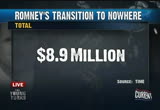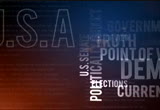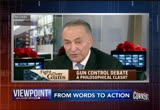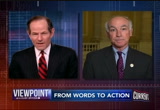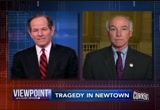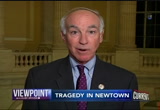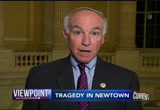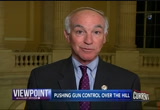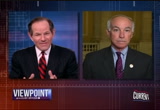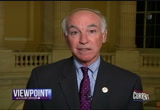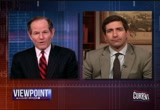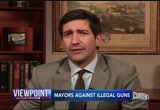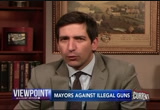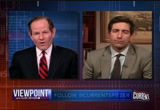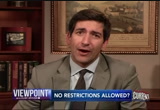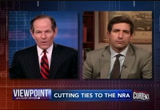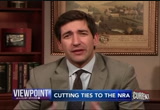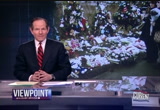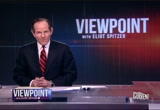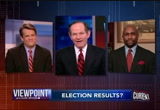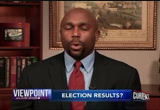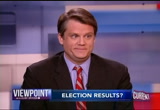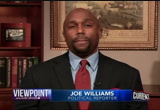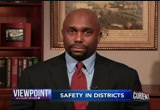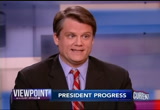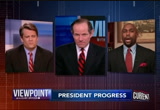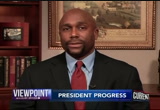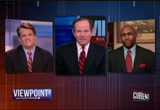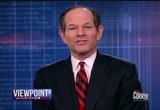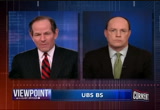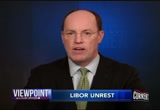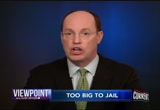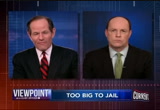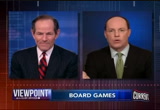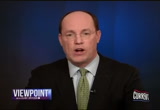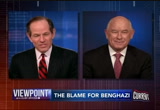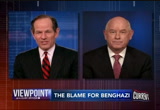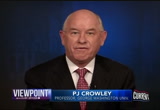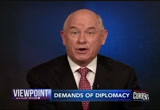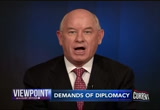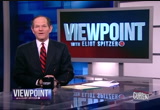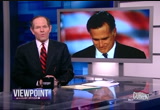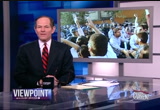tv Viewpoint With Eliot Spitzer Current December 20, 2012 5:00pm-6:00pm PST
5:00 pm
to nowhere. do you know how much it cost? $8.9 million. man, they are unbelievable. they spend that on furniture how long did you sit on the furniture? obviously failure. last elbow of the year goes to mitt romney and the gop. here's your transition. transition from off the top. i like the symbolism there because romney whiles out the gop when he falls on them. think about it. everybody have a great christmas. i can't believe i said that on a progressive show. happy holidays, everybody. come back! you can always catch us on you tube or the youngtucker.com. we'll see you there. "young turks," thank you. >> eliot: good evening. i'm eliot spitzer and this is "viewpoint."
5:01 pm
it has now been six days since the tragic shooting at sandy hook elementary school where 26 people were murdered including 20 innocent children. funerals continued for the victims as today grace mcdonnell, benjamin wheeler allison wyatt catherine hubbard and jesse lewis and teacher annemarie was laid to rest. the task force met for the first time today. at the top of the meeting, joe biden stressed the task force will look at all factors contributing to gun violence including mental health and cultural issues. a balanced approach the democrats see as a way to garner republican support for modest gun control. >> gun control in reasonable ways, yes but also mental illness, violence and those kinds of things, when i talk to my republican colleagues in the senate who are pro nra in the last few days, they express that over and over again. but even a balanced approach to curbing gun violence may not be enough to sway house republicans. >> vice president's
5:02 pm
recommendations come forward we'll certainly take them into consideration. but at this point i think our hearts and souls ought to be to think about those victims in this horrible tragedy. >> eliot: but if you think national republicans near total silence over the past week is an indication their views have softened, you would be wrong. republican governors have shown that the g.o.p. still believes the answer to gun violence is more guns. >> if people were armed not just a police officer but other school officials that were trained and chose to have a weapon certainly there had been an opportunity to stop aggressors coming into the school. >> eliot: wow. joining me now is congressman joe courtney, democrat of connecticut. welcome and thank you for joining us. >> thank you eliot. >> eliot: you know, i have to start, of course, how are folks doing in newtown in the communities affected? are people finding it harder as the funerals occur day by day? >> the pain of this horrible
5:03 pm
event on last friday, i again just kind of he can cost and reechoes with each day of multiple funerals for children at any parent, any family can immediately identify with. so the shock is still incredibly deep and intense. and the revulsion of you know, just the way this thing has played out last friday, i think again is really making a level of anger and determination to make sure that it doesn't get brushed under the rug. >> eliot: in a way emotionally, the hardest part will after the funerals when there is nothing but silence. that's most devastating. you heard the clip where republican governors are beginning to say if only teachers were armed. if we had guns in the classroom. if principals had guns. it strikes me as so completely not only wrongheaded and counter intuitive but almost revolting.
5:04 pm
am i wrong in that reaction? >> not at all. victoria soto, whose exam of courage, again i think has resonated with every american, certainly every teacher you know, that's the kind of person that goes into teaching. she was motivated to connect with kids, to make that magic connection and she was by all accounts a wonderful teacher. my nephew went to school with victoria at eastern connecticut state university. so you know, the notion that you're going to start sending teachers to boot camp as part of a certification which is almost kind of required to follow governor mcdonnell and governor perry's suggestion is ludicrous. you know, school safety is an important component of this. we need to get administrators best practices. a lot of buildings frankly are out of date in terms of entering and exits but the bottom line is you can't expect schools to turn into fortresses and teachers into soldiers. >> eliot: the notion we would
5:05 pm
start having a gun in every classroom instead of spending the time and energy in working with our teachers to educate our children better is so antithetical to everything we're supposed to be about. if that is, in fact, where we're hearing leading republican voices, will there be enough republican voices in the house to move even sort of centrist, easy issues on gun control? >> well, you know, i'll tell you. as someone from connecticut as you can imagine this week, a number of republicans came up to me to express condolences and we had real conversations about what's the appropriate response. i actually detected a much greater appetite for change from some of the conversations than the clips that you have. i'm not trying to be -- you know pollyanna-ish here. that's why the public awareness and public engagement has to continue very strong. your program the president you know, who's got bully pulpit, of course can't let up on this. it is almost like the civil
5:06 pm
rights struggles of the '50s and '60s in terms of pressure to force congress to change. >> eliot: in terms of the violence that exists within our society, the gun violence, this is a civil rights issue. it is an issue of our basic citizenship. you're right. president needs to keep speak on it. needs to do something that was so powerful yesterday which is to stress the divide between the leadership of the nra and the membership of the nra. the membership of four million folks who say yes these measures make sense, do you think we can create a divide between the wayne lapierrres of the world and other folks who may be hunters but they want reason and sanity. >> we've gotten calls and e-mails from nra members in the rural part of my district. one fella i talked to is an nra instructor. actually has a federal license for machine guns but he was adamant that you know, some of the discussion about assault weapon restrictions, high capacity clips are totally appropriate. and that you know, he really
5:07 pm
felt that the leadership didn't speak for him. this is a guy who has been a life-long member and a very active person in terms of gun programs in the state of connecticut. i actually think this is not just a talking point the president said. there is an underlying reality there is movement within the organization's grassroots membership. >> eliot: their power has been generated from the grassroots. they're able to mobilize. calls to your office or letters or you see them in the district. you encounter them. but if the membership says you know what, we're not quite where wayne lapierrre is on this, it is fruitless to predict what he does tomorrow. but if the nra were to have this critical moment where it said okay, we embrace the notion of the sorts of measures you just articulated, that could change the whole debate, i presume. >> totally. again, i -- truly believe that a lot of hunters and sportsmen out there you know, really don't
5:08 pm
want to be sort of cast as you know opponents and just roadblocks to moving forward to a safer country. >> eliot: i think that's right. i'm hoping, tell me if you think this is a possibility, the president in the state of the eun will make kid safety gun control, a centerpiece and an emotional centerpiece of what he speaks to the nation about. >> i was there obviously sunday night at the interfaith vigil and i can just tell you when he was delivering those remarks this is not talking points that his staff had fed him. this was coming from the heart. the look of determination on his face when he came in from flying into the state of connecticut you know. he is -- this is real. and i just think it's not just -- positioning. on an issue here. this is something that i think is going to be a hallmark of his presidency second term. >> eliot: the emotion just oozed out of every pore of his body sunday evening when he delivered those remarks and read the names of the 20 children, my
5:09 pm
goodness, it was impossible not to be overwhelmed by the emotions. it was remarkable. >> the reaction inside that room, it is not like anything i've ever seen. you and i have been to lots of funerals, military funerals where emotions run high. when those names were being read, the names of the teachers, it just -- it was pure, raw emotion and grief. and we've gotta make sure we don't let go of that. as we approach the challenges of again, getting to the -- a better place for our country. >> eliot: well said. let's hope it happens. congressman joe courtney, thank you for joining us. >> thank you eliot. >> eliot: let's bring in mark glaze, director of mayors against illegal guns. thanks for joining us. >> thanks for having me. appreciate it. >> eliot: you and your organization have been on this issue properly so for a long time. there is unfortunately a recurrence of these tragedies. will this be the fundamental shift in the tectonic plates we've been waiting for to permit real reform to finally make it
5:10 pm
through congress? >> well, clearly there's been a tectonic shift, whether it results in action by congress we'll find out in january and february. maybe a little later. but there's no question this time really is different. and there's lots of anecdotal ways that those of us who do this work for a living. watch. and all of the indicators are there. people who don't normally pay a lot of attention to this issue suddenly are. we're having enormous outporing of interest in getting involved from attorneys around the country, from law enforcement around the country from silicon valley tech leaders from celebrities, people who you know, are as horrified as the rest of us but for whom it hasn't been their issue suddenly they're pouring in with offers to help. that never happens. >> eliot: there are a core set of proposals the president articulated at his press conference will presumably guide vice president's biden's task force that will report back
5:11 pm
quickly. let's push the limits here a little bit. what are the more creative ideas? go beyond the limit on magazine size and closing the gun show loophole. what -- you have been in the forefront of this. what would the next steps be to do something more dramatic? >> well, i don't -- the thing that brings 800 mayors together we started the week last friday at about 740. today we crossed 800. people who came to us and wanted to vote. you don't actually have to get all of that creative to solve a big part of the problem. you should give everybody a background check try to find the law that could actually keep assault weapons off the streets. if you wanted to create it, there are lots of things the states are doing and more importantly, lots of things that cities are doing mayors deal with this problem in a very direct way. they don't deal with it as an ideological question. when a cop gets shot on the beat, they're the ones who have to deal with it. mayors in cities like new york
5:12 pm
and elsewhere have participated in things like gun buybacks where you offer people a little bit of money it encourages them to bring in their guns. you have about as many guns as people. unless you, through programs like this or other ones, have to find a way to just get some of the stock that's out there off the streets and either destroy it or get it back in the law-breaking -- nonlawbreaking hands. >> eliot: the 300 million number is obviously the one that is the center of the debate. do gun buybacks, do it alone stop and frisk which is sometimes a topic of substantial conversation from the civil rights perspective. these are critical ways to recover guns but if every gun you get off the streets that an illegal gun can prevent a crime. do we need to put $5 billion into gun buybacks that, will do more for safety in our streets than anything else the way australia did, not that number but proportionately.
5:13 pm
is that something we should say to the federal government, let's buy them and melt them down. >> it is certainly an option. i know some cities do this quite successfully and i don't know what the number is that you would need to spend either at the federal or city level to do it right. but i'm sure it is something that a lot of municipal leaders and a lot of state leaders are thinking about and they should. it is also the case that part of the reason that we have historically low violent crime in new york city this year is that we have a very significant police force that experiments with technology and has at its disposal some of the strongest gun laws in the country because we understand you don't want people from other states where they'll hand you a concealed carry permit even if you can't satisfy basic training requirements to carry guns in our cities. so you know, i think it has to be a symphony of different things.
5:14 pm
and some things that are appropriate in new york may not be appropriate for those in montana but what works in new york is that we take the gun law seriously. we do do gun buybacks and we have a police force that takes finding illegal guns wherever they are in the city very, very seriously. >> eliot: one of the things that happened this past week obviously, cerberus, the private equity firm agreed to sell or chose to sell the freedom group which controls many gun manufacturers so sort of equity came to play and you referred to the fact that silicon valley folks and other tech types are coming to play now in this arena. is there an angle here that finance can say to the companies that produce and support the nra, the drive the ideology that is pro gun can be pushed back on their heels a little bit by folks who say we don't want to make money that way. we don't want our dollars invested that way. is there a way to sort of change their perspective through a mercenary argument but nonetheless, one that might work? >> well, we were really delighted as you might imagine
5:15 pm
to have the support of the tech leaders who are titans in their industry. who are speaking with the same voice we are and saying the same things. essentially what they're saying is this is not the country we want to live in. you can have a very robust second amendment in which people might -- my dad who was a federally licensed gun dealer can use and buy and sell essentially whatever they want but at the same time does much more to keep illegal guns out of the wrong hands and recognizes the fact that we have reached the tipping point in this country when it comes to semi-automatic assault rifles and clips that are able to facilitate mass murder by allowing one person who shouldn't have a gun to fire many many times very quickly without having to reload. it is has just reached a point where these mass tragedies have accelerated. they've become worse and yet you have got to deal with the problem at a moment when people are ready to hear you. >> eliot: that's exactly right which is why acting now acting
5:16 pm
with speed is critically important. director of mayors against illegal guns, mark glaze, thank you for your diligent work. >> thank you. >> eliot: there is a lot we don't know about gun violence. we can certainly make beneficial changes based on what we do know. that's next. (vo)answer: pour disaronno into a flute glass and top with prosecco. brought to you by disaronno. be originale.
5:18 pm
5:19 pm
>> eliot: there's much we still don't know about the tragedy in newtown but there's a shocking amount we do know about gun violence in this country. first, we know na there are an estimated 300 million privately-owned guns in america. we know that guns are responsible for over 30,000 deaths a year. with another 65,000 injured but not killed. we know that almost 20,000 american children and teens are shot every year. we know that every day 87 people die from gun violence. 33 of them murdered. we know that since friday,'s soul-crushing massacre there have been 80 incidents of murders across 27 states. victims were as young as 3 years old, most were teenagers and young adults. the shootings took place in homes, cars, a hospital, a casino a grocery store and many right out on the street. we know that in the last half century, 15 of the world's 25
5:20 pm
deadliest shootings happened in our country. our closest rival is finland with two. we know that of the 11 deadliest shootings in this country six have happened in the past six years. we know that where there are more guns, there's more homicide. whether you're comparing states within this country or comparing us to other countries. we also know that states with stricter gun laws have fewer deaths from gun-related violence. from 1994 to 2004, when the assault weapons ban was in place, murder rates dropped 6.7% below what the rates were projected to be without the ban. we know that 40% of all legal gun sales are not subject to federal background checks because they all within what is widely known as the gun show loophole. so what then? don't we know? we don't know exactly what motivated adam lanza to do what he did in newtown. while more funding for mental health screening and treatment is necessary this country we don't know if that alone would are saved the lives of those 20
5:21 pm
children. we don't know what could have happened if a teacher or principal in the school had been armed even though prominent republicans like virginia governor bob mcdonnell and texas governor rick perry among others are proposing it as a solution. we don't know if an armed teacher or principal would have made much of a difference. we also don't know if our culture of violence portrayed in movies and video games should bear part of the blame despite politicians on both sides of thule use aisle using this to deflect the focus from guns to the other potential problem areas. we don't know why when congressman jack kingston says "was this young man addicted to violent video games was there a hollywood influence? i think we can't just stop at guns." nobody just wants to stop at guns but we do want to start with them. there are several things we don't know but what we do know is where we can start to take action. we know that last friday, it was semi-automatic guns, once deemed deadly enough to ban that took
5:22 pm
the lives of 20 6 and 7-year-old children and seven others. semi-automatic guns killed 12 in aurora in july. it was semi-automatic guns that killed six and wounded 13 including congresswoman gabby giffords in tucson last year. it was semi-automatic guns that killed 33 at virginia tech in 2007. and we know that none of the tragedies would have occurred if not for the guns. so while the country grasps for answers and washington tries to offer solutions let's honor the victims by starting what we know the guns are the problem. >> i am here to make a citizen's arrest. (vo) current tv presents a month long festival of true stories. get real for the holidays.
5:25 pm
>> eliot: there were times when it felt like the presidential election would never end then thankfully it finally did. faster than karl rove could say cuyahoga county, fftdz over before the mail-in votes were counted. another way to phrase the question, beyond having a winner, do elections have results? democrats were quick to claim a mandate for the president but republicans as evidenced by their stance on the fiscal cliff, don't seem to agree. here to help sort it out is political reporter joe williams and chief economic correspondent for politico, ben white. thank you both for joining us. joe, let me begin with you. i have this notion that this sort of theological hard right loss this election whether it was immigration, the reality that marginal tax rates will go up on the wealthy, the debate
5:26 pm
about same-sex marriage, do they now need to recast their whole ideology in the context of that result? >> if they do, they're not doing a very good job of it. basically, the biggest change we've seen are in the faces. not necessarily in the rhetoric. we have marco rubio emerges as the front-runner for g.o.p. leadership in 2014 or beyond. we have tim scott being appointed to replace jim demint but you take a careful look at these positions at least in two examples, phillip almost exactly the same. john boehner's negotiating on the fiscal cliff which looks a lot like it did on the debt ceiling, a year and a half, two years ago. we have a lot of discussion on the right about how things need to change but we don't have a lot of fundamental change they can point to in this stage of the proceedings. >> eliot: ben, when i look at the pivot point issues of the election, it was same-sex marriage, it was immigration. it was perhaps if there was one
5:27 pm
question, should marginal rates on wealthy go up and every one of those questions in the debate we're having right now seems to be going in the direction of the president. >> i think the problem you have is at least in the house republican caucus, they don't view the election results the same way that you do, the same way that the president does. they see that the president won solidly. they retained their house majority. a lot of them won in comfortable districts by large margins. i don't think they need, particularly on taxes and the economy, need to change their position very much. i think people thinking more broadly realize they have to make some adjustments on immigration, same-sex marriage, some other issues, house republicans don't see it that way. certainly not on economic issues on taxes. they have moved off the hard line. no tax increase at all. that's an election result but it is not far enough to get to where the president is. >> eliot: it is a small bore result without being a fundamental theological shift. i think what ben is saying, you come in as an executive suddenly you find out the
5:28 pm
legislature doesn't see things the same way. ben is pointing out it may be because of gerrymandering but nonetheless, the house republican majority shrank but not by that much. a lot of the members won by comfortable margins. they don't see the fundamental question should tax rates on the rich go up the same way we do. john boehner is having a hard time pulling his conference with him. maybe there isn't a shift of the republican party. don't they need to shift if they're not going to take a beating in 2014? >> you would think so. the broad assessment for what happened, you have the republicans saying this was a status quo election. the democrats are saying the people agreed with us and by a significant margin. so both sides are describing aú situation that's exactly the same only completely different. now, the thing about the republicans having to change, you are absolutely right. they won by comfortable margins in gerrymandered districts because they flipped the state houses. they won largely at the state level. gerrymander based on the 2010 census results i submit if not
5:29 pm
for that tactical move, we probably would have seen a larger change in the house. you've got -- >> you also have the problem of republican primaries coming up in 2014. you won't see a lot of folks in the house move very far toward the president particularly on economic issues. they're not worried about the next general election which they think they can win easily. they're worried about primary challenges on the right. if they sign on for significant new tax revenues without really big spending cuts -- they're going to hear about it. it is a pretty instance gent situation for them. >> eliot: as long as the republican fear comes from the right and not from the center or the left, the pressure will be there. joe, you made an important point. it is gerrymandering, the interesting thing there is if you look at the united states senate races where you can't gerrymander state boundary line, the democrats picked up a considerable number and won a lot of races. in the house the state houses have increasingly been controlled by republicans. gerrymandering pretty much made
5:30 pm
it is a status quo election. one of the things that struck me was the president who was basically lacking the core passionate public support through most of his presidency began to pick it up in june of this year when he went back to his progressive roots. am i just sort of imposing on this history, something i want to see then? or do you think this is actually an articulate statement of what happened? >> i think he picked up a lot of support when he made the case firmly that he believed in order to deal with the deficit we need to ask the wealthy to pay more. we need the tax rates to go up on the wealthy. that was helpful to him. but at the same time in the negotiations with boehner, he realizes he's got a house republican conference that isn't going to come along with what the national numbers might say. some of the national numbers that support tax increase, same-sex marriage are driven up by very big blue states like california and new york that the president won by a lot. they're very much behind the things he wants to do but he's dealing with a house republican caucus that doesn't identify with that. >> eliot: i want to talk about this in a purely theoretical
5:31 pm
issue. democrats have been afraid to touch same-sex marriage until recently. immigration. gun control. the third real issue. joe, if seems to me that when the president has finally put his arms around these issues and said i will talk about them, i will articulate what i think our society and community should look like, the public support for him has gone way up. that, in fact, may have been the biggest divide that he created between himself and mitt romney. >> i think that's true on a couple of levels. not only in describing what america should look like. but also in how these policies can help every day americans. how the policies can help the guy down at the factory, the woman behind the waitress counter, the people in the emergency rooms. but i think we've got a couple of things that are going on here that are post-election that have caused the c word to pop back up in president obama's lexicon and that is compromise. the first is the fact that he's dealing as ben said with a very
5:32 pm
intransigent section of the house he knows boehner can't get him to come along with. he's got to have some sweeteners in there in order to get just the sufficient raw votes to get something passed. the second thing is -- i'm probably going out on a limb here. i think the tragedy in sandy hook -- the president has mentioned more than once he expects that the american people expect people to be adults and that this tragedy has focused that kind of perspective on him in a way that usually it hadn't. i submit that up until that point or up until these two points when reality sets in, the president probably was more willing to storm and make sure that the progressive agenda gets heard but now we've had a different situation. he's enconsed with john boehner. he's got the reminder that people want adult leadership in the room. that's where his comfort zone usually is. >> i sort of thought that this tragedy might bring somewhat more adult nature to the conversation on the fiscal cliff and that we might get a more sort of stable and
5:33 pm
understandable resolution quicker. that's not happening. we're back at the exact same kind of partisan breakdown we had on the debt ceiling. ultimately they reach the divide and get to a deal that can pass. in terms of easing the tone in washington, that's not happening. >> eliot: that lasted 72 hours. it seems to me you're both right. public wants compromise but the public also wants the president to fight. he continues to articulate that agenda. the public will be with him and so yes you put up a good fight and then you did close the deal but if you close the deal without articulating and fighting first then there will be dispace of support within his base. that's something he cannot afford. joe williams, ben white, thank you both for your insights tonight. >> thank you. take care. >> eliot: never have so few been rewarded so well for losing so much.
5:34 pm
5:37 pm
>> eliot: if there was a theme in business this year, it was scandal unpunished. fines against hsbc, expensive mistakes at citi corp, jpmorgan chase cries out for real reform and real arrests of senior executives. where is the justice and where is the justice department? joining me now, dennis kelleher, president and ceo of better markets. dennis, is it fair to say that by in large, wall street and senior executives continue to get off almost scot free?
5:38 pm
>> the objective evidence proves that to be true. the real question is when is the law going to be applied to wall street like it is applied to the rest of main street and the rest of america. it is interesting, at the press conference announcing the ubs settlement of $1.5 billion the head of the criminal division said crime on wall street will not be tolerated. while he was indicting a japanese subsidiary of a swiss bank. and i know that geographically challenged they may think they're getting closer to wall street but wall street's much closer than either of those places. i can't wait for them to find it. >> eliot: i suppose some people looked at this and said at least there is a guilty plea. the litany of major corporate default is enormous. it was the battle days all over again. it was as bad as 2002, 2003, 2008 2009. it was an amazing litany. yesterday, ubs did have to
5:39 pm
acknowledge some guilt. now, is this a reflection that justice is finally recognizing they've been an abject failure until now? how do you interpret this? >> everybody that believes in the rule of law should hope that that's the case. however, when you look at the absolute egregious nature of the knowing criminal conduct that ubs, i believe the mountain of evidence actually made it impossible for the department of justice to do anything else. we have over 2,000 separate incidences over six years of intention to manipulate the libor market. it involved 45 specific individuals with written evidence and those written -- the written communications actually touched 70 additional individuals where you had supervisors not just aware of what was going on but encouraging it. with the mountain of evidence they had they had to have an indictment and they to at least arrest a couple of the traitors. the real question now is doj serious or was this a headline so they can move on?
5:40 pm
>> eliot: do they continue to work up the organization, as you point out indicted a subsidiary that's one big piece of water away. that doesn't mean a whole lot. the issue is we have gone from too big to fail to too big to jail and arguably too big to manage. are we at a point where we need to say the institutions have to be fundamentally restructured or else we will never be able to impose any sense of ethics and business prop eyety -- propriety upon them? >> it is increasingly clear to people who have been willfully blind to this that they're not just too big to fail. they're too big to manage and too big to jail and too big to indict. they're too big to exist. it is not just on wall street where you see jamie dimon having no idea what's going on in his chief investment unit even though the complaints certainly indicate otherwise. everything from ubs to barclays, deutsche bank is under siege for
5:41 pm
pretty egregious allegations of conduct across a whole range of illegal activities. so it really does span the globe and the libor criminal conspiracy brings it to the floor about how pervasive the lawlessness really is at these global banks. >> eliot: to move away from the banks as institutions and they are rife with the behavior you have been describing and have been pointing to for so long you were a corporate lawyer for many years so you know this stuff inside out. let's focus for a minute on the new york fed which is something we talked about earlier in the year. it still has on its board bankers who themselves have an enormous conflict of interest because they should not be running the new york fed. we haven't dealt with the most simple issues of corporate governance with the fed. how does that continue? >> well, it is also pretty egregious -- talk about the fox in the chicken house. you not only have major ceos
5:42 pm
of the banks on advisory committees. they're intimately involved in a whole variety of aspects of the new york fed. those conflicts have to end. you know, the poster child for this is jamie dimon the head of jpmorgan chase. the london wale exam where the trade went wrong when they lost $6 to $9 billion and he claims that not only didn't he have any idea what they were doing but he admitted under oath that no one in the executive management, risk compliance or legal had any idea. but recently, it didn't get a lot of attention. but a 135 page complaint was amended in new york that doesn't detail allegations to the bank. they detail allegations as to the ceo himself who is sitting on the boards at the new york fed. >> eliot: right. >> that's just wrong. >> eliot: the new york fed i've believed -- it is egregious. if we understood it and viewed it that way, it would make it
5:43 pm
palatable. very quickly just a couple of seconds, the vocal rule, perhaps the most important way to get tax dollars out of subsidizing the banks is. it going to be put in place in the next six to nine months? >> is it going to be put -- >> the real question is whether or not it is going to be loophole laden after the wall street war. on the -- which is to prevent the high risk proprietary rating that the banks engage in which is what the london wale trade was about. it's important to remember that's the type of high-risk trading that contributed significantly to the financial crisis and to the economic crisis that still laying economic wreckage from coast-to-coast in this country. that's what's really at stake when we talk about financial reform and proprietary trading. that's why they need to get the rule right. >> eliot: dennis kelleher, i think it is time for a big dose of eggnog to make it more palatable. thanks for joins tonight.
5:44 pm
5:46 pm
5:47 pm
♪ ♪ >> eliot: findings make three things absolutely clear about the deadly september 11th attack on the u.s. diplomatic mission in benghazi, libya that left four americans dead. one, conservative conspiracies alleging a cover-up are pure fiction. two, diplomatic security funding provided by congress was grossly inadequate and three there is no evidence to suggest that u.n. ambassador susan rice did anything at all wrong. joining me now to discuss the real challenges of foreign diplomacy is the ever wise p.j. crowley, professor at george washington university and a former assistant secretary of state for public affairs for president obama. sir, you have watched -- the hearings today in congress where senator kerry presided over the discussion of this report. seemed a little bit like a dog and pony show where you know, fingers were being pointed everywhere but where they should
5:48 pm
be. am i wrong about that? >> there's a lot of responsibility to go around. obviously there were miscalculations made within the state department. they did not see the level of threat that existed and did not appreciate the decline in security that preceded september 11th. libya bears a great deal of responsibility and i think the other aspect is that the state department overestimated libya's fundamental responsibility under the vienna convention to provide a basic level of security. but absolutely right eliot. there has not been the consistent funding for security and what ironically, what the state department is being asked to do now it does not necessarily have all of the resources it needs to accomplish what we expect. >> eliot: p.j., i don't want to mix issues that don't have much to do with each other but it is akin to the republicans saying we need more money in healthcare because we can eliminate shooting when they're the ones cutting it.
5:49 pm
they're upset about lack of diplomatic security. they're the ones cutting it throughout the congressional budget. you made a fas mating point in an article today where you talk about expeditionary diplomacy. the nature of diplomacy has changed as we are sending our diplomats into nations where there have been revolutions on-going turmoil and security is harder and what we ask of our diplomats is harder and they're sort of in an intermediate position between diplomacy and warfare. explain what that means for their security and their jobs. >> sure. as americans, we tend to think that once the military action stops, the work is done. for the state department, when the battle is over, the work of advancing that society and building the institutions within that society is just beginning. so we had a successful intervention last year. gadhafi's gone but now comes the arduous work of building up libyan institutions and to help with that, you actually need people in the middle of the fray. that's what chris stevens was
5:50 pm
doing in tripoli and doing in benghazi and obviously this involves a great deal of risk. >> eliot: and when warfare was more readily defined troops on a battlefield. you had trenches, guns pointed at each other, it was easy to say now you're at war. now war's over. you have diplomacy the way it was in the 1800s. diplomatic immunity. where warfare is not as crisply defined, you have the groups who are not actors, it is much harder to send diplomats into the regions and both guarantee their security and know when they'll be challenged. that's why the threat assessments are much more complicated. >> senator corker today raised an appropriate question which is did these guys belong there? and the answer is they did. and what the state department has learned through benghazi is rather than rely on others, whether it's the security provided by a government or the security provided by a military, when they put diplomats into these situations in the future, they just simply have to have a greater level of internal
5:51 pm
security that can provide the protection of the diplomats. >> eliot: the tragedy is ambassador stevens was one who especially not only enjoyed but felt it was his purpose and job ton ot forward lines extending this sort of diplomatic purpose he felt was inherent in his job and that's what put him at risk. this is something that will be continuously confronted by the next secretary of state. perhaps john kerry who presided over this hearing today. could you see the am ambivalence understanding this is his next mnd date? >> this will be the first thing on his desk should the president nominate him he will be confirmed. this will be among his first challenges on the job. it is important to connect you know, there are multiple conversations going on here in washington. the fiscal cliff and benghazi are connected in the sense that beneath the fiscal cliff argument is a presumption that the level of resource the government will decline which means government will be asked to do more with less.
5:52 pm
and we have this idea that when the war ends, military spending can go down. diplomatic spending can go down and so forth. but when the military spending -- the military requirement ends, actually the requirements for diplomacy go up. but i think we have to understand that the complex nature of this dynamic and make sure that our diplomats have the resources that are necessary and the support necessary to do what we need them to do to bring these societies forward from conflict to being a more stable contributor to the international system. >> eliot: the problem as you said, p.j., it is a complex idea. it will find no traction in washington. p.j. crowley thanks as always for your wisdom and insight. >> my pleasure eliot. >> eliot: my view on the year that was coming up next. that's half that's not half! guys, i have more! thanks mom [ female announcer ] pillsbury crescents. let the making begin the saying easy as pie? i get it now. just unroll it
5:53 pm
5:54 pm
5:55 pm
theologically rigid right wing agenda. romney's embrace of the social and economic agenda of the more rabid base of his party in the primary season doomed him from the shrill immigration rhetoric to the harshly insensitive theory that no additional sacrifice or contribution should be sought from those at the top. even as he tried to move away from the sharpest edges of this primary rhetoric, the damage was done. and the public said we do not see this as a principled way to governor. his defeat was not simply the arithmetic of voting blocks. it was the larger statement we all did build this. the sense of community in our politics and society reasserted itself against the hard individualism of the republican right. hence the near certainty that congress will enact immigration reform and tax rates that require the wealthiest to pay more. in the aftermath of the election, it seems clear that the two theologians of the republican party grover norquist on taxes and wayne lapierrre on guns are now struggling.
5:56 pm
this is good for our politics. second, the flip side of this. the president did best and his majority when he spoke to true progressive values. he was tep nid the embrace of the values and his numbers were flat. the public disengaged from his efforts but when he spoke up on the agenda, the public cares about from same-sex marriage to immigration reform to a fair distribution of the burdens of paying for our future, the public responded. the lesson is clear. the timorous politics of so many democrats who feel compelled to rush to the middle, to be meek, to shy away from the agenda of change that is needed, is not only wrong substantively. it is wrong politically. third, revolutions are messy things. the initial euphoria of the arab spring the most important policy event has been replaced by the grind of upheaval that has no clear direction. yet the move toward secular society does seem to have
5:57 pm
traction. the desire for freedom as we understand it seems to be real. surely, there are forces, the islamists desire to impose intolerant theology into a powerful and threatening force. yet in egypt the foundation of democracy and freedom is visible, if under threat. whether the state of egypt ends up replicating pakistan, we would hope not or turkey, we would hope so. it surely will not be iran. the middle east is quite simply still a mess from syria to iran, yet the arc of progress as it is said does appear to be moving in the right direction. fourth, just because i can't resist coming back to this issue, at least briefly our financial system is still from out with structural problems and behavior that cut away at the core integrity of the fiduciary duty that should define financial transactions. from insider trading to libor bid rigging to analysts shelling for ipos they have an interest in it continues. it is par
191 Views
IN COLLECTIONS
CURRENT Television Archive
Television Archive  Television Archive News Search Service
Television Archive News Search Service  The Chin Grimes TV News Archive
The Chin Grimes TV News Archive 
Uploaded by TV Archive on

 Live Music Archive
Live Music Archive Librivox Free Audio
Librivox Free Audio Metropolitan Museum
Metropolitan Museum Cleveland Museum of Art
Cleveland Museum of Art Internet Arcade
Internet Arcade Console Living Room
Console Living Room Open Library
Open Library American Libraries
American Libraries TV News
TV News Understanding 9/11
Understanding 9/11